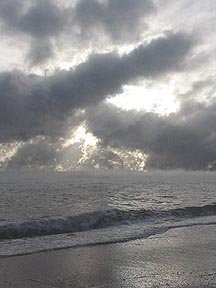One day Carl stepped into a hole that he didn't see coming. Instinctively, he braced himself for the inevitable impact, but, when no impact came, he gradually relaxed and began to take account of his situation. Looking up he could see the tiny, slowly receding oval of light that must be the hole he'd fallen through. "I'm falling," he thought. It was dark so he stretched out his hands and discovered that he was surrounded by stone, just beyond his fingertips, in all directions, except of course down. "A well?" he thought. Once his eyes had adjusted somewhat to the ever dimmer darkness, he noticed that there was a window, about a foot wide and running parallel to him, just to his left. "Must be a very tall window," he said. A face appeared in the window.
"Hello," said the face.
"Hello," replied Carl.
"How do you do?" asked the face.
"About as well as can be expected, thank you very much," answered Carl. A long, awkward silence followed this exchange, during which Carl tried to peek over at the face without drawing too much attention to himself--he wasn't sure if he liked this new development. The face was by all appearances disembodied and Carl could see it only very indistinctly through the obscuring window panes. Its cheeks especially seemed rather purple or perhaps teal, and it glowed ever so slightly.
"I wonder what I look like to him?" thought Carl.
"So," asked Carl, "are you falling too?"
"Me?" replied the face, "oh, no; I'm on my way to Dallas."
"Dallas?" asked Carl, "That's where I'm from."
"Really!?" screeched the face, "How do you like it there? Is it wonderful?"
"Oh, yeah, it's OK, I mean, I like it there and all, but--"
"Gosh! I can't wait to see it, we should probably be there soon!" interrupted the face, now very excited.
"That's what I'm trying to tell you," said Carl, "I'm afraid that we're going the wrong direction."
"The wrong direction?" asked the face.
"Yeah, you see I was just in Dallas when I accidentally stepped into this hole and I've been falling ever since. So we must be going away from Dallas."
"I see," said the face, "then I guess I'll just change directions, no big problem."
Carl took a moment to examine the face more closely; he was less nervous now, since he seemed a pretty nice fellow. He could make out hair, a neck, and even the outline of shoulders. A stiff collar gave away that he was wearing some sort of suit, perhaps even one similar to Carl’s. Everything was still strangely colored the same purple and teal, and the face’s eye sockets looked empty.
"Well?" asked Carl eventually.
"Well what?" asked the face.
"Are you going to switch directions?"
"Oh, I already did."
"But we're still falling," said Carl.
"Still falling?"
"Yeah, so that means we're still going away from Dallas." said Carl, growing a little annoyed.
"But I've just switched directions," asserted the face.
"I don't know what to tell you," said Carl.
It had become totally dark; looking up Carl could not see even a trace of the hole. He peered down at his feet, they were absolutely obscured in darkness. But he noticed that he could make out the feet of the face very clearly. He let his gaze fix upon them, marveled by something unexpectedly familiar. Perhaps these were the shoes of his father? Or even a pair he’d seen recently and been interested in buying. What ever it was, it seemed that he just couldn’t pin it down.
The face finally said, "It must be your fault then."
"My fault!?" asked Carl, now becoming angry.
"Yes, your fault," replied the face.
"How could that possibly be?" demanded Carl.
"Well, until I met you I was going toward Dallas, now I cannot go toward Dallas, no matter which direction I go. All that's changed since then is you, so it must be your fault."
Carl made a fist. "I can't believe you're blaming me for this!" he said, "anyway, you never switched directions. In fact, you didn't do anything."
"Maybe that's what you say," returned the face. Carl could now make out tiny pinpriks of light within the hollow sockets. "Those must be his eyes," he thought.
"No, it's the damn truth! We're falling and it's not my fault!" yelled Carl.
"You're impossible, I don't even know why I tried," said the face.
"Me? You're impossible! Maybe we could have been friends, but you've been nothing but obstinate and--"
"Still, it stands to reason that it's your fault, you must at least see that," interrupted the face.
"Listen, I've had enough," said Carl with a sigh, by now totally exhausted, "how long do you suppose this tunnel goes on for any--". With a dull thud and the snapping of breaking bones Carl died instantly.

























